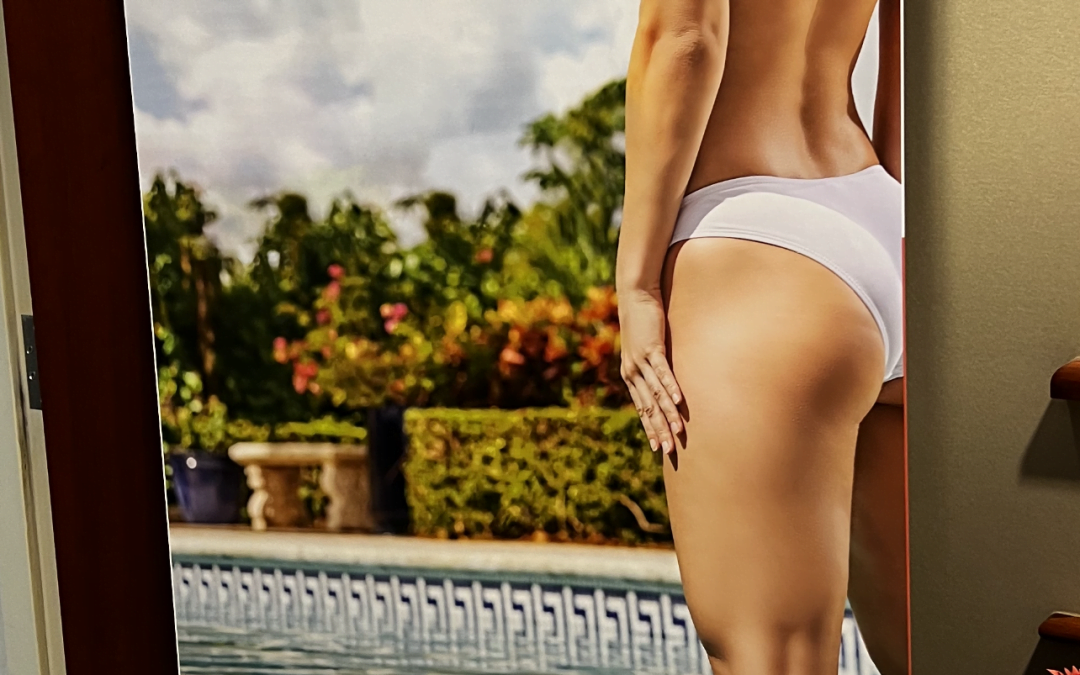
Can Your Doctor’s Office Trigger Bad Body Image?
Can Your Doctor’s Office Trigger Bad Body Image?
Sometimes I get tired of all the subtle ways women are told they’re not good enough. I’ve gotten used to it happening in magazines, commercials, and in all the ads that tell us how to look younger, prettier, sexier, and skinnier. So I expect to see those messages in certain settings, which I can mostly avoid.
I just never expected to see that in my OB-GYN’s office.
Today when I walked in, (after a nice long Covid hiatus of which length we won’t mention) I was greeted with not one, but two full-sized standing banners advertising liposuction and laser therapy. Literally flanking the front of the check-in counter, with a whole table of anti-aging skin products laid out in between. With “You deserve to feel like yourself again!” slogans next to life-size pictures of smiling, women without wrinkles or cellulite anywhere. So, as I walked up to check in for my appointment (where I planned to discuss the various fun things one might discuss when she’s 48 and has had 3 kids, etc etc) I had to reach across all of this in order to check in with the receptionist! Even in the bathroom, there were more ads up with before and after pictures advertising wrinkle removal- right up next to that cute little silver cupboard where you deposit your urine sample. These were also spread out in my patient room. Really?!
I guess things had changed in the practice during those years when I was away.
One might say that I’m just a cranky middle-aged woman that’s having a hard time getting older and is taking this too personally. That’s actually not the case at all. My 40’s have been a pretty incredible decade of learning to love myself with all of my imperfections, and I feel more beautiful now than I did back in my 20’s- even with all my gray hairs and wrinkles. I also have nothing against the beauty product or cosmetic surgery industries, as they can be sources of wonderful help and healing for people of all genders. I just think there’s a time and a place for this kind of advertising, and it’s not the kind of thing I’d expect or want to see at my OB’s or any other of my doctors at any age.
– not when I went in expecting to hear my first baby’s heartbeat and heard… nothing
– not when I went in for a post-D&C appointment after my miscarriage
– not when I was pregnant with my firstborn.
– not when I had my first breast exam after a lumpectomy
Not for a whole host of other reasons that so many women have to navigate and work through when they come in for their OB appointments for less than happy reasons.
For those of you still reading, thanks for staying with me through this rant.
And if you just so happen to have the name of a great OB practice in NOVA, go ahead and pass that my way.
Shannon Wise
When I read my friend Shannon’s post, I knew I needed to address this with the community. There’s just so much to unpack here.
In my years of seeing and treating hundreds of teens and adults struggling with eating disorders, poor body image, and shame, after a while, I begin to see a few trends along the way.
In no particular order, below are the triggers that are typically expressed by clients that have led to their eating disorders
1. Bullying
2. Severe dieting
3. Caregivers that diet, hyper-focus on eating overly healthy, and being thin.
4. Comments made by pediatricians and other physicians
5. Advertising and Social Media
6. Depression and Anxiety
Yes, you read that right, comments made by doctors. For a field that’s supposed to “first do no harm”, why is it that we’re seeing them on this list? Physicians ONLY need to take 1-1.5 credits focused on eating disorders during their studies. While it’s great that they can identify and diagnose an eating disorder, shouldn’t prevention and treatment be some of the focus? So often doctors suggest weight loss programs, tell patients they are overweight, that the cause of their illness is weight related, and praise them when they come back in a smaller body. This praise and the need to lose weight to be taken seriously can ultimately lead to one of the deadliest mental health disorders facing people. So when and how do we start expecting more from our providers? When do we start to hold them accountable and open their eyes to the microaggressions found in their offices? When will fat phobia and bias be left at the door and physicians start treating the person as a whole? Because right now, just telling people to lose weight isn’t helpful, it’s harmful.
About a year ago, one of my employees went to a gastroenterologist due to ongoing stomach pain, cramping, and heartburn. After coming out of anesthesia due to getting an endoscopy, the doctor’s only suggestion was……………you guessed it weight loss. This normally happy woman left the office that day and relayed the story to us in tears and looking defeated. She felt ashamed, embarrassed, and self-conscious, and still had no answers as to how to fix this problem.
Now I have lost count of how many of my clients have described when they first started to have eating disordered thoughts, that one of the causes of them was the way their pediatrician commented on their body size, and each time these clients quoted their doctors told them “you’re overweight”. If a patient continues to hear that from someone who they believe to be an expert in health, it’s not too hard to expect the patient will begin to think of themselves in a negative light. “I’m not good enough”, “Something’s wrong with me”, “I’m clearly doing something bad and wrong”. This narrative needs to change, help not hinder.
So lo and behold – I went to my OBGYN for my yearly appointments last week and opening the entrance to the waiting room my stomach dropped to my ankles. I was flooded by the images that Shannon described. Ads to look better by getting liposuction and more.
As I teach my clients how to advocate for their needs and rights, how to see themselves with neutrality and with loving kindness, and to reject the need to conform to the – I must do so myself and I hope you do too. The doctor at my practice helped deliver my baby 16 years ago. She is a wonderful doctor. But I can NEVER refer to this practice to any of my clients or any person for that matter.
Have you had similar experiences? Did this affect your body image?
I know I am going to hear from my colleagues that I shouldn’t post these pictures, as they are triggering. Yes. I know. Exactly.
None of us are spared from this reality and it is everywhere we go.
Will you join me in allowing yourself to take up space in this world and use your voice?
Heather Baker, LCSW, CEDS
Founder of Prosperity Eating Disorders and Wellness
www.prosperityedwell.com






